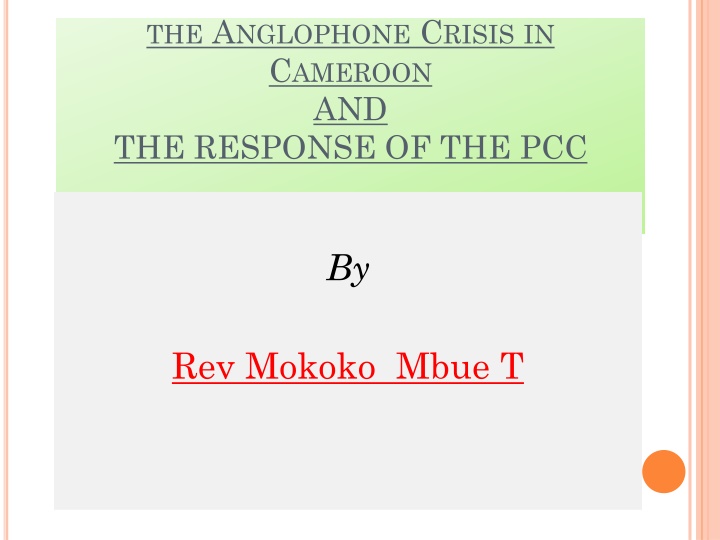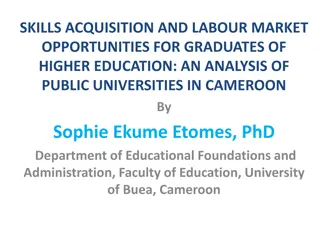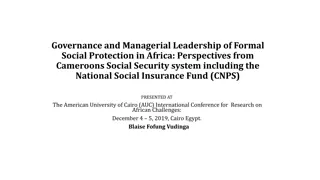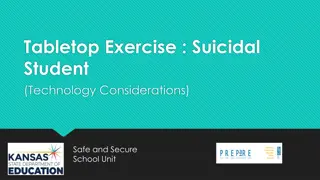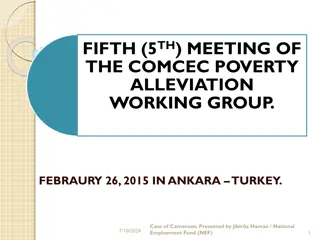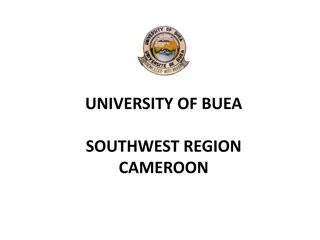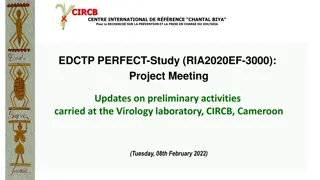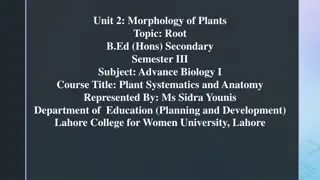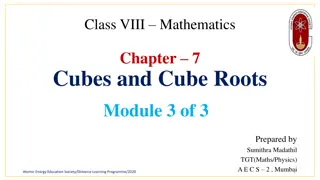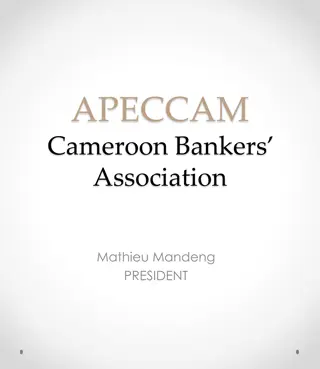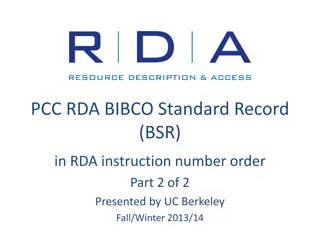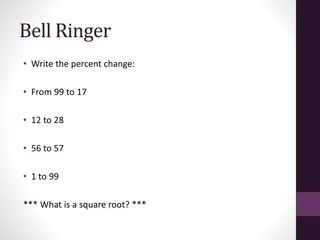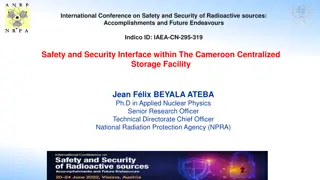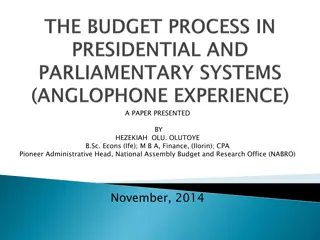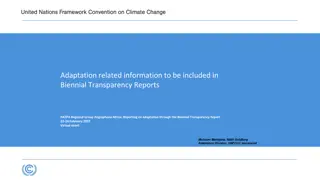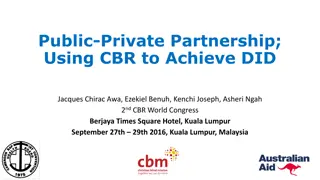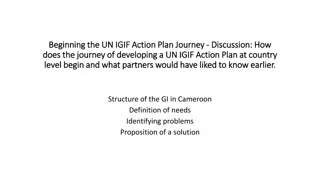The Anglophone Crisis in Cameroon: Historical Roots and PCC's Response
The Anglophone Crisis in Cameroon stems from the country's colonial past, dating back to the partition between Britain and France. This crisis has evolved over the years, leading to recent developments and tensions. The Presbyterian Church in Cameroon (PCC) has played a significant role in addressing the Anglophone problem. Government reactions have also shaped the situation. Explore the historical roots, evolution, recent developments, the PCC's role, and government responses to understand the complex issue.
Download Presentation

Please find below an Image/Link to download the presentation.
The content on the website is provided AS IS for your information and personal use only. It may not be sold, licensed, or shared on other websites without obtaining consent from the author.If you encounter any issues during the download, it is possible that the publisher has removed the file from their server.
You are allowed to download the files provided on this website for personal or commercial use, subject to the condition that they are used lawfully. All files are the property of their respective owners.
The content on the website is provided AS IS for your information and personal use only. It may not be sold, licensed, or shared on other websites without obtaining consent from the author.
E N D
Presentation Transcript
THE ANGLOPHONE CRISIS IN CAMEROON AND THE RESPONSE OF THE PCC By Rev Mokoko Mbue T
OUTLINE 1. The Historical Roots of the Anglophone Problem 2. The Evolution of the Anglophone Problem 3. Recent Developments 4. The Role of the PCC in the Anglophone Crisis 5. Government s Reaction
THE HISTORICAL ROOTS OF THE ANGLOPHONE PROBLEM 12thJuly 1884 Cameroon was colonized by Germany 1914 WWI broke out and Britain and France attack Germany in Cameroon 1917 Germany was defeated in Cameroon and through a bilateral arrangement Cameroon was partitioned between Britain and France.
THE HISTORICAL ROOTS OF THE ANGLOPHONE PROBLEM This arrangement was confirmed by the League of nations in 1919 1917 1961 Cameroon was governed as two separate colonial entities under two different colonial masters with two different political and social cultures
THE HISTORICAL ROOTS OF THE ANGLOPHONE PROBLEM (CON D) - 1stJanuary 1960 Independence of The Republic of Cameroon - 11thFebruary 1961 Plebiscite for British Northern and Southern Cameroons
THE HISTORICAL ROOTS OF THE ANGLOPHONE PROBLEM (CON D) Foumban Conference (July 17th 21st1961) Some resolutions of the Foumban/ Yaounde Conference i. The name of the new nation was the Federal Republic of Cameroon ii. Two independent educational and judicial systems to be followed iii. Two languages of equal status iv. Two regional assemblies (one for East Cameroon and another for West Cameroon), one house of Chiefs for Southern Cameroon and one national assembly v. A president and Prime Minister to lead the young nation
THE EVOLUTION OF THE ANGLOPHONE PROBLEM - The 1966 political coup and the formation of the CNU Party - The 1972 Referendum and change of name from the Federal Cameroon to the Cameroon Republic Republic of of United - The 1984 change of name from the United Republic of Cameroon to the Republic of Cameroon and its political implications
THE EVOLUTION OF THE ANGLOPHONE PROBLEM - The rebirth of multipartism and its consequences on Anglophones - The GCE Board Crisis - Demands for an Anglo-Saxon university - The creation of Southern Cameroon National Congress (SCNC) 1995 and other organisations
THE EVOLUTION OF THE ANGLOPHONE PROBLEM (CONT D) - Persistent marginalization of the Anglophones: i. The exclusive appointments and other public functions ii. The stagnation and emasculation of developmental initiatives in Anglophone Cameroon (the closure of the marketing Board, POWERCAM in Yoke, the Tiko, Bali and Bafut airstrips etc) iii. Second-class treatment of Anglophones in appointments etc complaints about the use of French for
THE EVOLUTION OF THE ANGLOPHONE PROBLEM (CONT D) - All Anglophone Conference (AAC) I and II in 1993 and 1994 respectively - 2015 - Lawyers petition the government over the non-respect of the Common Law system and the imposition of Francophone judges and civil law in courts in Anglophone Cameroon. - October 2016 the lawyers associations go on a sit-down strike
RECENT DEVELOPMENTS - November 2016 teachers associations join the strike action in protest against the non- respect of the Anglo-Saxon education and the posting of teachers with no knowledge of English to teach subjects other than French in Anglophone schools 6th December 2016 Cameroon Civil Society Barrister Agbor Balla as President and the demand for a return to the Federal System of government - Calls for Ghost towns from 7thJanuary 2017 by the Consortium system of creation Consortium of the with
RECENT DEVELOPMENTS - January 12th 13th, 2017 government through the Ghogomu engages dialogue with the teachers and lawyers associations in Bamenda Adhoc Committee - February 2017 internet cut, the arrest of the leaders of the Consortium, transfer of the leadership of the Consortium to the Diaspora and the radicalization of the crisis - 22ndSeptember 2017 mass protests across Anglophone Cameroon
RECENT DEVELOPMENTS - 1stOctober 2017 Protests in request for independence of the Republic of Ambazonia - October 2017 - Full armed conflict - January 2018 the arrest of Nera 10 Sessekou Ayuk Tabe and Co in Nigeria - A fractured Diaspora
THE ROLE OF THE PCC IN THE ANGLOPHONE CRISIS - The PCC and the GCE Stalemate - The PCC s stance on the creation of an Anglo-Saxon University - The PCC and multiparty politics - See: Cry Justice: The Church in a Changing Cameroon edited by Nyansako ni - Nku - November 2016, the Moderator of the PCC, together with the Bishop of the Arch Diocess of Bamenda made efforts to broker peace between the trade unionists and the governor of the North West Region. - The PCC, in different communiqu s to the government has articulated its stance on the issue and urged government to initiate dialogue.
THE ROLE OF THE PCC IN THE ANGLOPHONE CRISIS (CONTD 1stCommuniqu was the Moderator s usual New Year Message to the Presbyterians January 2017 (at the early stages of the conflict). It was titled Pastoral Letter: Our God is a God of History in this letter the Moderator wrote: One thing which is clear is that God remains the Lord of our history and calls us to repentance so that our country can experience the reason why He made us Cameroonians. Those who insist on the uneasy coexistence should be able to answer; how can there be co-existence without mutuality and trust? Those who call for federalism must also be reminded that even in the new fragments of the federation, there would be minority problems. on the 1stof
THE ROLE OF THE PCC IN THE ANGLOPHONE CRISIS (CONTD Those who call for secession must be reminded historically that there cannot be any secession without bloodshed like the cases of Yugoslavia, South Sudan, and Eritea, just to mention a few. Those who call for decentralization must answer; why for all this while the so-called devolution of competences to local councils have dragged on or why should institutions in one council pay their taxes to another council area? So, you see, the problem of Cameroon has been one of peace without justice, Justice without truth and bad faith in governance. This is the time for truth.
THE ROLE OF THE PCC IN THE ANGLOPHONE CRISIS (CONTD The Moderator articulated the stance of the PCC as follows: 1. We recognize the efforts of the Prime Minister of the Republic of Cameroon in creating adhoc committees to see into the issues tabled by Teachers Trade Union and Common Law Lawyers. While this is a starting point, may all the preliminary objections be cleared comprehensively in order for these committees to function fully. Those who are called to these committees must show a high sense of patriotism, truth, good faith and humaneness. We call for dialogue, peace and understanding so that we can identify the points of weaknesses, the areas of our common strengths and how we can rekindle a spirit of trust, a spirit of tolerance and a spirit of love.
THE ROLE OF THE PCC IN THE ANGLOPHONE CRISIS (CONTD 2. We condemn acts of violence perpetuated by the Forces of Law and authorities. Such acts should be investigated and the officers involved brought to book. In the same light, anyone who is in detention should be proven guilty of violence otherwise it is unlawful to keep people behind bars for an indeterminate period of time. Order and some civil before detention; 3. All proposals for reconciliation should have both short and long term considerations.
THE ROLE OF THE PCC IN THE ANGLOPHONE CRISIS (CONTD 4. The government of Cameroon, the Teachers Trade Unions and Common Law Lawyers should do everything possible commencement of schools and private practice of the Common-Law Lawyers. to see into the 5. We volunteer our services and our facilities as a Church that will lead to genuine reconciliation and long lasting peace; hoping that this will contribute to the healing of our Land.
THE ROLE OF THE PCC IN THE ANGLOPHONE CRISIS (CONTD 2ndCommuniqu : On the 27thof January 2017 the Synod Executive Committee sent out another letter on the Anglophone Crisis a letter that was endorsed by the Board of Trustees. In the letter, EXCO stated: We thankfully acknowledge the creation of the commission on Bilingualism and Multi- culturalism as a vehicle to bring about national and social cohesion and to create a climate of mutual understanding and patriotism among Cameroonians.
THE ROLE OF THE PCC IN THE ANGLOPHONE CRISIS (CONTD To further concretize this move as a Church, we prayerfully call on all the stakeholders to take all the necessary measures to ensure effectively and that the ghost town be called off as a matter of urgency. that schools resume In the same vein, we earnestly propose that Amnesty be granted to all those who are detained because of their political ideologies, and those detained because of crimes committed within this period, should be detained and tried in the regions where they were arrested, so that their rights to be cared for by family members and friends would be guaranteed. This will be a commendable sign of goodwill from the state of Cameroon. We equally plead that further arrest should be discontinued. We also humbly crave that internet be reinstated wherever it has been embargoed to restore trust and our emerging economy.
THE ROLE OF THE PCC IN THE ANGLOPHONE CRISIS (CONTD It would be of most importance if the state of Cameroon would comply with the decisions arrived at during the last meeting with the Teacher s Trade Union Leaders to enable effective resumption of schools. We call on all PCC Christians nationwide to go on their knees and pray for a peaceful and lasting resolution of this situation that has invaded and tarnished the social fabric of our society.
THE ROLE OF THE PCC IN THE ANGLOPHONE CRISIS (CONTD The third communiqu was jointly signed by the Moderator of the PCC, Cameroon Baptist Convention and the 5 Roman Catholic Bishops of the Bamenda Ecclesiastical Province on 9thFebruary 2017. They stated: the President of the We think that the non-resumption of schools in the North West and South West Regions is a pointer to more profound socio-political issues that need to be identified and addressed sooner than later, it is important to note that the oppressive, intimidating and unbearable attitude of some members of civil administration, such as the attitude of the Governor of the South West Region, has further hardened the hearts of the common people.
THE ROLE OF THE PCC IN THE ANGLOPHONE CRISIS (CONTD Furthermore, the inhuman treatment, torture, rampant arrests and the complete shutdown of the internet and consequently of businesses and services that depend on an internet connection for a smooth functioning have aggravated the situation. As pastors, preachers of the Good News and mediators of social justice and peace, we earnestly appeal to the Government and the people of Cameroon for a change of heart and to engage in a meaningful and constructive dialogue. We further call on our Christians and people of good will to pray fervently for wisdom and understanding to seek true and lasting solutions that will guarantee justice and peace.
THE ROLE OF THE PCC IN THE ANGLOPHONE CRISIS (CONTD) Synod Messages (2016) The 48thSynod of the Presbyterian Church in Cameroon dubbed Synod of Unfailing Love meeting in Bamenda at Church Centre Mankon from 20th to 21stNovember 2016, as concerns the Anglophone crisis, inter alia, requested the President of the Republic to: as soon as possible, engage in dialogue with the Trade Unionists and Common Law lawyers whose plight is gaining steam and attracting solidarity from other quarters and pray for the cessation of any form of violence on peaceful protesters who only want to be heard.
THE ROLE OF THE PCC IN THE ANGLOPHONE CRISIS (CONTD) And to the governor of the North West Region Delegates expressed concern on the recent brutalization of Common Law Lawyers and pray you to restrain any use of force and bring to book overzealous officers who have overstepped their bounds. Delegates encourage you to pursue the path of dialogue you have begun and commit themselves to pray for peace and justice.
THE ROLE OF THE PCC IN THE ANGLOPHONE CRISIS (CONTD Sermon for the Opening of the 2016 Synod The Moderator of the PCC, Rt. Rev Fonki Samuel, in a sermon preached on the 20thof November at PCC Ntamulung on the occasion of the opening of the 48thSynod, concerning the Anglophone problem said: It is only a fool who keeps sleeping in his house when that house is on fire. Recent happenings in the Anglohpone part of our country and the silence of the powers that be are very disturbing. The uniqueness of our country in Africa and in the world is something to be upheld with pride. Our bilingualism is not a curse but a blessing, our bi-cultural identity is not a curse but a golden touch, our bi-jural system is not a curse but a jewel that places Cameroon and Cameroonians in front of the whole world. Should we hold these blessings with fragile and careless hands? Should we toy with these?
THE ROLE OF THE PCC IN THE ANGLOPHONE CRISIS (CONTD To blatantly and officially abuse the Constitution of our country that protects this unique bilingual and cultural identity of our country is not a thing to be taken for granted or ignored by those who have this country at heart. To enter into an international protocol and produce a document that ignores one of the official languages of the country is not an error to be made because that alienates a people and creates tension and agitation in them. To negotiate for what is the Constitutional right of a people is not only dehumanizing, but bad faith. When what is the Constitutional right of a people applies to A it should immediately and unconditionally apply to B.
THE ROLE OF THE PCC IN THE ANGLOPHONE CRISIS (CONTD That is objectivity, transparency and fair-play that have been trampled underfoot frustration of a people. It has been too long that the Cameroon Common Law Lawyers and the Stakeholders of Anglo Saxon education have been crying that there is a systemic and endemic destruction of their cultural identity. Should they keep crying and no one to listen to and console them? Should they keep striking and emergence in such an situation? Should they keep leaving in a hopeless and helpless situation? Are they a fatherless people? It is true that if the powers that be turn to be insensitive to the sentiments and the genuine voices of her people s cry, then the unexpected can happen. to the pain, anger and boycotting? unhealthy Can and there unfriendly be
THE ROLE OF THE PCC IN THE ANGLOPHONE CRISIS (CONTD Synod Message (2018) - The 49thSynod of the Presbyterian Church in Cameroon, meeting in Bafoussam from the 20thto the 21stof January 2019, under the theme Synod of Endurance in its letter to the President of the Republic made the following remarks: 1. Our nation, over the last two years, has gone through its most challenging independence a crisis which has challenged the very essence of our existence as a nation. 2. The two Anglophone regions till date are buried in a senseless war which pits one Cameroonian against another, and which has consumed the lives of numerous citizens, especially the youth who are the backbone of development. 3. This has led to the collapse of traditional authority and social cohesion that has seriously affected the economy and led to the displacement of thousands of civilians both internally and externally. . crisis since
THE ROLE OF THE PCC IN THE ANGLOPHONE CRISIS (CONTD 1. Innocent civilians are suffering from arbitrary arrest, extortion, intimidation, kidnappings, torture and even murder. Caught in this vicious web, your citizens, are lamenting. 2. In these upheavals, the PCC has not been spared. Church houses and schools and other properties have been burnt down, houses of worship have been desecrated, Pastors, teachers and their families have been attacked and Christians have been maimed and displaced. The Church which has the duty to pray for the nation and which over the years has been a partner in development with the government feels targeted. . molested, and many
THE ROLE OF THE PCC IN THE ANGLOPHONE CRISIS (CONTD Synod reminds Your Excellency that the position of the PCC vis- -vis the current crisis, as evidenced by the numerous communiqu s from the Moderator and Synod Committee Executive, has not changed it remains the call for inclusive and constructive dialogue. Synod recommends the following: 1. That Your Excellency, after all the broad-based consultations, should engage in inclusive dialogue as a matter of urgency 2. That Your Excellency should accelerate the legal procedure of all who have been arrested as a result of the current crisis. 3. That government should facilitate the convening of the Anglophone General Conference by religious leaders to form the groundwork for dialogue.
THE ROLE OF THE PCC IN THE ANGLOPHONE CRISIS (CONTD) - The PCC has called for two sessions of fasting and prayer for all Christians of the PCC - The PCC has called for general fundraising in the congregations to support the refugees. Congregations are donating foodstuff and clothing for the persons in the forests and reaching out to some of them. But the enormity of the need is daunting. - PCC congregations have raised funds and assisted the teachers who have gone for months without salary - The PCC championed the drafting of the position of CEPCA on the Anglophone Crisis
THE ROLE OF THE PCC IN THE ANGLOPHONE CRISIS (CONTD) - The PCC has been part of the initiative of the Anglophone General Conference (AGC) alongside Cardinal Tumi, the Baptists and the Imams of Buea and Bamenda to form a platform for dialogue amongst Anglophones to prepare for a genuine national dialogue - The PCC is part of an ecclesiastic initiative of CEPCA, the Episcopal Conference, the Orthodox Church and the Islamic Grand Council to push national and international stakeholders for the resolution of the Anglophone Crisis. The Moderator was a delegate at the famous Grand National Dialogue
THE ROLE OF THE PCC IN THE ANGLOPHONE CRISIS (CONTD) Support to IDPs Support to IDPs has been local and Central. Local congregations do fund-raising, and where possible are assisted by partners, to carter for IDPs in their locality. Meanwhile, the Central Church, through local and partner funding, reaches out to IDPs congregations Support was given to all Presbyteries in 2018 when the crisis hit its peak and displacement rose to a record-breaking figure in Cameroon. This aid touched the lives of over 30,000 displaced and host families throughout the country. Since 2018, the PCC gives semester humanitarian assistance to IDPs. Support is sent to Presbyteries either in cash for on-the- spot purchases or in kind for direct distribution to IDPs. Over 90,000 IDPs and host families have received relief items. through Presbyteries and
THE ROLE OF THE PCC IN THE ANGLOPHONE CRISIS (CONTD) Through Direct Partners in Germany10,000 IDPs in Meta, Donga Mantung, Ngie, Ndop, Bui, Menchum, Meme North, Meme South, Mamfe, Akwaya, Dikome, Kumba, Bali, Bafut, Mezam, Fako North and Fako South have received food and non-food items to relieve their situation during a period. 50 displaced Pastors were assisted in their host Congregations and communities. In partnership with the Methodist Church in Britain, the Moderator visited and gave support to over 1,000 Refugees in the Calabar, Ikang and Ogoja camps.
GOVERNMENTS REACTION - Subtle threats to Church leaders - Siege of the Synod Office / accusations against Rt. Rev Awasom - Remanding and questioning of Synod Clerk Rev Nyansakoni-Nku - Lawsuit against the Rt. Rev Fonki Samuel and other Church leaders in April 2017
CONCLUSION The Church has a role to play in the public arena. For the Church to be the salt of the earth its impact must be felt beyond the walls of the Church as it strives to bring practical responses to the practical needs of the people. The Church does not engage in partisan politics, but the Church is not neutral in political issues. The Church must always ask the question: What is God calling us to do/say at this point in time Action informed by fervent prayer is always powerful!
Thanks for your kind attention Thanks for your kind attention
